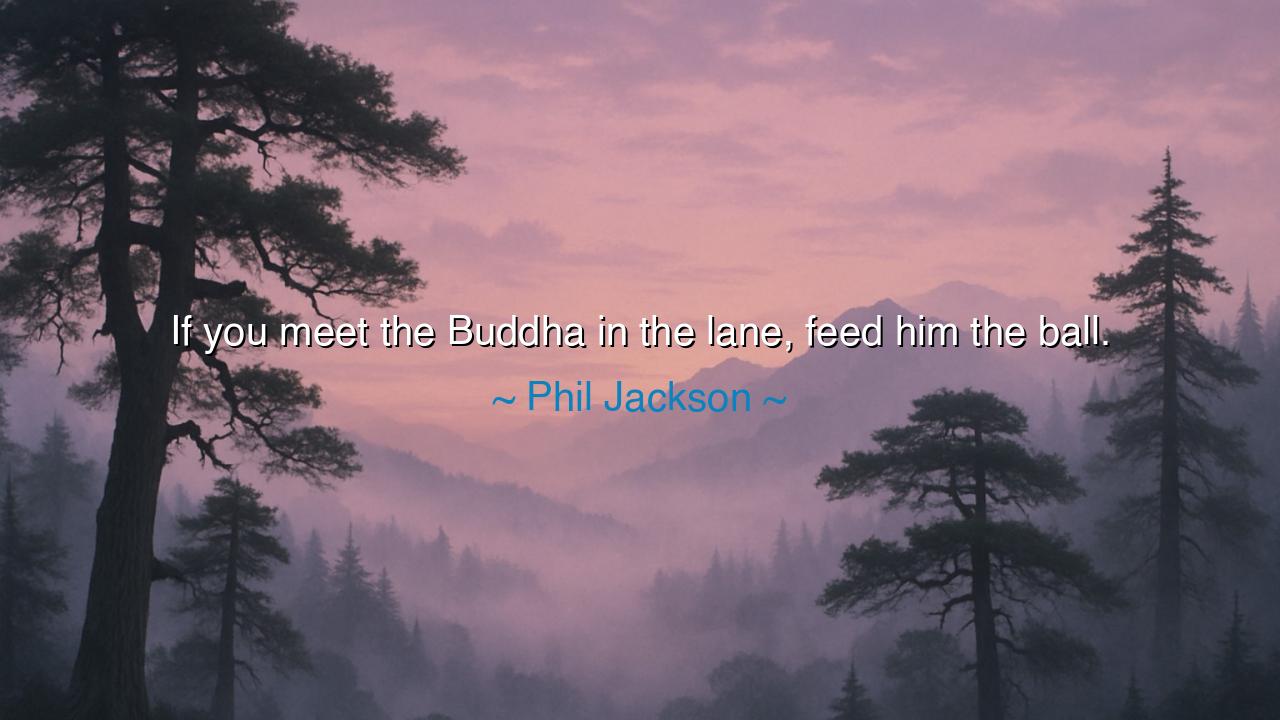
If you meet the Buddha in the lane, feed him the ball.






When Phil Jackson, the Zen Master of basketball, proclaimed, “If you meet the Buddha in the lane, feed him the ball,” he wove together two worlds—the mystical wisdom of the East and the fiery arena of the NBA. In his words, the calm of enlightenment met the chaos of competition. At once humorous and profound, the saying reveals the essence of both leadership and trust: when you encounter greatness, do not question it, do not hinder it—simply recognize it, and give it what it needs to flourish.
The origin of this phrase lies in Jackson’s deep study of Zen philosophy. The saying plays upon a famous koan: “If you meet the Buddha on the road, kill him.” The koan does not call for violence, but teaches that one must not cling to idols or external forms of enlightenment, for true wisdom lies within. Jackson, ever the alchemist of sport and spirit, translated this idea into the language of basketball. On the hardwood, the “Buddha in the lane” is the player who has reached a moment of truth, clarity, and dominance. To deny him the ball would be to deny the natural flow of the game. To “feed him” is to surrender ego, trust in greatness, and let the play unfold as it must.
The ancients would have understood this well. For in war, when the general sees the warrior aflame with inspiration, he does not pull him back—he lets him charge. In music, when the singer strikes the divine note, the others do not drown him out—they harmonize with him. In life, when wisdom or brilliance appears before us, the wise do not cling to their own pride—they make space for it. Jackson’s metaphor is timeless: when you encounter greatness, yield to it, serve it, and let it shine for all.
Consider the story of the 1991 NBA Finals, when Jackson’s Chicago Bulls faced the Los Angeles Lakers. Michael Jordan, the Buddha in flight, was unstoppable, yet Jackson taught his team that victory would not come from Jordan alone, but from recognizing when and how to share the ball. In the decisive Game 5, Jordan fed John Paxson, who hit basket after basket to seal the championship. Here the lesson was made flesh: wisdom is not only in knowing who the Buddha is, but in knowing when to pass, when to trust, when to make space for another’s brilliance.
The lesson is clear: in life’s court, you will encounter Buddhas—moments, people, and opportunities that shine with clarity and power. Do not let pride or fear hold you back from supporting them. If the Buddha is in the lane, do not dribble in circles or hoard the ball—feed him. Trust the moment, trust the greatness before you, and you will find yourself part of something larger than yourself. For true victory is not won by the ego alone, but by the harmony of trust, humility, and service to greatness.
What then must we do? First, train ourselves to recognize greatness when it appears, whether in ourselves or in others. Second, silence the ego that always seeks to dominate, and learn to support, to pass, to share. Third, live with the wisdom of flow: when the universe presents a moment of clarity, do not resist it, but join it with all your strength. For in yielding, you too are lifted.
Thus, Phil Jackson’s words endure as more than a clever basketball quote: “If you meet the Buddha in the lane, feed him the ball.” They remind us that greatness is not ours to control, but ours to honor. Let us then walk the lanes of life with eyes open, ready to pass when we see the Buddha, ready to trust the flow of the game, ready to become not just winners of contests, but partakers in something timeless and divine.






AAdministratorAdministrator
Welcome, honored guests. Please leave a comment, we will respond soon